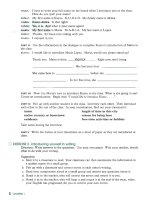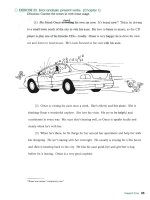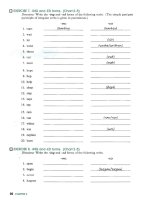Fundamentals of english grammar third edition part 60 pot
Bạn đang xem bản rút gọn của tài liệu. Xem và tải ngay bản đầy đủ của tài liệu tại đây (427.54 KB, 7 trang )
his key. This was a very big problem for my unfortunate uncle because he
(dras, not)
properly. In fact, he
(wear)
31 32
nothing but a towel. Poor Uncle Ernesto! "What
(I,
do)
?"
',
,>
33
he asked himself.
,
Instead of
(stud)
in the hallway with only a towel, he
.':I
fi
l
34
(decide)
>
(get)
help. So he
(start)
35
36
(walk)
down the hall toward the
37
38
elevator. He thought about
(knock)
on someone else's door
39
(ask)
for help, but decided it was better
(ask)
40 41
the hotel personnel. He hoped the elevator would be empty.
,
8
When he
(reach)
the elevator, he
(push)
42
43
''I
the down button and
(wait)
.
When it
(come)
>
44 45
Uncle Emesto
(mk)
a deep breath and
(get)
in
46
47
even though the elevator wasn't empty. The other people in the elevator
(surprise)
when they
(see)
a man who
(wrap)
48 49
in
a
towel.
50
Uncle Ernesto
(think)
about
(qy)
51 52
(explain)
his problem, but unfortunately he
(know, not)
53
any Norwegian. He said, in English, "Door. Locked. No
54
key."
A
businessman
in
the elevator
(nod)
,
but he
(smile, not)
55
.
Another man
(look)
at Uncle
56
57
Ernesto and
(smile)
broadly.
58
After an eternity, the elevator
(reach)
the ground floor.
59
Uncle Ernesto
(walk)
straight to the front desk and
(look)
60
at the hotel manager helplessly. The hotel manager
61
Gerunds and lnflnltlves
401
8,
1
(have
to
understand, nor)
62
any language
Cfgure)
out the problem. My uncle
63
(have
to
say,
nor)
a word. The manager
64
(grab)
a key,
(take)
my uncle by the
65
66
elbow, and
(Iead)
T
him back to the nearest elevator.
67
(.
. .
My uncle
(embarrass, still)
about
68
this incident. But he
(laugh)
a lot when he
(teU)
69
70
the story.
EXERCISE
41.
Review of verb forms: writing. (Chapters
1
-
13)
.
L
Directions:
Write a composition about one of the most embarrassing experiences you have
had in your life.
1
.
:
!
1
,,
.
.;$
.
,
'
,
i(
-
I
CONTENTS
14-1 Noun clauses: introduction
14-6
Other
uses of that-clauses
14-2 Noun clauses that begin with a 14-7 Substituting so for a that-clause in
question word
conversational responses
14-3 Noun clauses
with
who, what, whose 14-8 Quoted speech
+
be
14-9 Quoted speech
vs.
reported speech
14-4 Noun clauses that begin with ifor 14-10 Verb forms in reported speech
whether
14-1
1
Common reporting verbs:
tsU,
ask,
14-5 Noun clauses that begin with that
am/*&
S
v
0
(a) I know
'his address;
(noun phrase)
S
v
0
@)
I how
where he liues!
(noun dause)
Verbs are often followed by objects. The object is usually a
noun phrase.*
In (a):
his address
is a noun phrase;
his address
is the object of the verb
knm
Some verbs can be followed by noun clauses.*
In
@):
where he lives
is a noun clause;
where he
lives
is the object of the verb
know.
o
A
noun dause has its own subject and verb.
sv
I
SV~
In (c):
he
is the subject of the noun clause;
lives
is the verb
(c)
I
how
where
he lives.
of the noun clause.
(d)
I
how
where
my
book
is.
A
noun dause can begin with a question word.
(noun clause) (See Chart 14-2.)
I
(e) I don't how
@Ed is murried.
A
noun clause can begin
with
if
or
whether.
(noun clause)
(See Chart 14-4, p. 409.)
I
(f)
I
how
that the world
k
round.
A
noun dause can begin with
that.
(See Chart 14-5,
(noun clause) p. 414.)
*A
phrase
is
s
group
of
related words. It does not canrsin
a
subject and
a
verb.
A
clau~
is
a
group
of
related
words.
It
contains a subject and
a
verb.
14-2
NOUN
CLAUSES
THAT
BEGIN
WITH
A
QUESTION
WORD
I
.
~
~.
.
~
.
.
.
I
Notice in the examples:
Usual question word order is
NOT
.
.
used
m
a
noun clause.
(a)
Where
dm
he
liw?
(b)
I
don't know
where
he
Em.
INCORRECT:
I
know where does he
liw.
(c)
When
did
thW
have?
(d)
Do You know
when
thW
b/t2*
CORRECT:
I
know where he lives.
(e) What
did she say?
(f)
Please tell me
what
she said.
I
(a)
Whv
is
Tom
absent?
I
(hl
I
wonder
whv
Tom
is
absent.
I
~
~
I
(i)
Who cam
to class?
I
(j)
I
don't know
who came
to class.
1
;Ti) and
(i):
Question word order
I
(k)
What happened?
I
(1) Tell me
what happened.
and noun clause word order
are
the
same when the question word is used
1
I
as
a
subject.
*A
question
mark
is
used
at the
end
of
this
noun dause because the
main
subject
and
the
verb
of
the sentence
(Doymr
know)
are
in
question
word order.
Example:
Lhyar
know
&
rhqr
bft?
Do you
bnau
asks
a
question;
whm
they
left
is a noun clause.
EXERCISE
1.
Information questions and noun clauses. (Charts
5-2
and
14-2)
Dimctim:
Are the given words (1) an information question or (2) a noun clause?
Add
"I
don't know" and a period to make a sentence with a noun clause.
OR
Add a capital letter and a question mark if the given words are a question.
1.
1
Aoh't
how
why he left.
(noun
clause)
-~~,v%s'
~',:,.=&.%,k$;
-{,;;
~
~:
Miwhy did he leave?
(information question);:i :.;I
'$
<;
:~;,
??,2
.,
-
;:.
? ,
,.,
$.*.
;:
'
where she is living
4. where is she living
5.
where did Paul go
6.
where Paul went
.
,
.
.
':
7.
what time the movie begins
~
i
, ,
,:I
8.
what time does the movie begin
9.
how old is Kate
why Yoko is
angry
I
11.
what happened
i
I
.
.
12. who came to the party
'
13.
who(m) did you see at the party
14. what did Sue say
. .
.n
15.
what Sue is talking about
I
.,%
/
404
CHAPTER
14
EXERCISE
2.
Noun clauses that begin with a question word. (Chart
14-2)
~.II
.t.,
&r;
Direchm:
Complete the dialogues by changing Speaker A's questions to noun clauses.
1.
A:
Where does Jim go to school?
B:
I
don't know
whew
Jiw
pes
to school.
2.
A:
Where did Natasha go yesterday?
B:
I
don't know. Do you know
yesterday?
3.
A:
Why is Maria laughing?
B:
I
don't know. Does anybody know
?
4.
A:
Why is
tire
hot?
B:
I
don't know hot.
5.
A: How much does a new Honda cost?
B:
Peter can tell you
6.
A:
Why is Mike always late?
B:
Don't ask me.
I
don't understand late.
7.
A:
How long do buds live?
./,
.
.:
:.,
.
B:
I
don't know
When was
the
I
don't know.
:
first wheel
in
Do you
knm
~
How many hours does a
e-<<*w
0
u
Q-
light bulb burn?
,.:
.
./.
,
'
I
don't know exactly
.
.i!
.
.
:
t
I
.
-
10.
A:
Where did Emily buy her computer?
B:
I
don't know
her computer.
11.
A:
Who lives next door to Kate?
B:
I
don't know next door to Kate.
12.
A:
Who(m) did Julie talk to?
B:
I
don't know to.
Noun
Clauses
405
EXERCISE
3.
Information questlons and noun clauses. (Charts 5-2 and 14-2)
Direcrimzs:
Ask and answer questions. Only the leader's book is open. Work as a class or in
groups.
Speaker
A:
Ask a question, using the cue.
Speaker B: Answer the question, beginning with either
'Y
don? know
.
.
."
OR
"I
think
. .
."
followed by a noun clause.
.
Example:
Ask
(
.
.
.
)
where
(
.
.
.
)
lives.
:,:,:.&.
.
LEADER
to
A:
Marco, ask Ingrid where Mustafa lives.
,
.
P:
SPEAKER
A:
Ingrid, where does Mustafa live?
SPEAKER
B:
I
don't how where ~ustafa lives.
OR
I
think that Mustafa lives in Reed
Hall.
1.
Ask
(
. . .
)
where
(
.
.
.
)
ate breakfast this morning.
.'.
~
,
,.
:
2.
Ask
(
.
. .
)
what
(
. . .
)'s favorite color is.
,
.!;
;
!
3.
Ask
(
. .
.
)
when
(
. . .
)
got up this morning.
4. Ask
(
.
.
.
)
why
(
.
. .
)
isn't sitting
in
hisher usual seat today.
*>
.ii
t'
,
5.
Ask
(
.
.
.
)
how
(
. . .
)
got to class today.
,
i:
F~
,
,:,7
:.,
6.
Ask
(
.
. .
)
what kind of watch
(
. . .
)
has.
7.
Ask
(
. . .
)
why
(
. . .
)
didn't come to class yesterday.
'
'b
7
.'
8.
Ask
(
.
.
.
)
where
(
.
. .
)
went after class yesterday.
,
,
,
:::
4. lnformatlon questlons and noun clauses. (Charts 5-$'and 14-2)
!crions:
Complete the sentences with the words
in
parentheses.
1.
A:
Where
(Susan, eat)
Aid
Swab
eat
lunch yesterday?
,
2
I
don't know where
(she, eat)
she
a+e
lunch yesterday.
A:
Do you know where
(Jason, work)
?
B:
Who?
A:
Jason. Where
(he, work)
-
7
B: Yes. How can I help you?
A:
How much
(that camem, cost)
?
B: You want to know how much
(this
camera, wst)
is that right?
;
:
,fj
A:
No, not that one. The one next to it.
:::,,A
,!
4.
A:
How far
(you,
can run)
without stopping?
B:
I have no idea.
I
don't know how far
(I,
can
run)
,
j
without stopping. I've never tried.
, ,
,:i.:
~;#,,,k,it,
,,:.I.:!<
,J!
:A
.i,
:.
:,
.
,
1';
I
:H
406
CHAPTER
14
5.
A:
Where
(you, see)
the ad for the computer sale last week?
B:
I
don't remember where
(I,
see)
it. One of the local
papers, I think.
6.
A:
Ann
was out late last night, wasn't she? When
'he,get)
in?
B: Why do you want to how what time
(she, get)
home?
A:
Just curious.
7.
A:
What time
(it,
is)
?
B:
I don't how. I'll ask Sara. Sara, do you how what time
(it,
is)
?
C:
Almost four-thirty.
8.
A:
(who, invent)
the first refrigerator?
B:
I
don't know
(who, invent)
the first refrigerator.
Do you?
9.
A:
Mom, why
(some people, be)
cruel to other people?
B: Honey,
I
don't really understand why
(some pwple, be)
cruel to others. It's difficult to explain.
10.
A:
I
don't care about
the
future. All
I
care about is today.
B: Oh? Well, answer this question for me. Where
(you, spend)
the rest of your lie?
A:
What do you mean?
B:
I
mean it's important to pay attention to the future. That's where
(you, spend)
the rest of your life.
4-3
NOUN
CLAUSES
WITH
WHO, WHAT WHOSE
+
BE
1
QUESTION
1
NOUN
C
v
S
S
v
(c)
Whose pen@
'this'?
(d)
TeU
me
whose
pen'thid
w.
S
v
s
V
(e)
@
in the office? (f) Tell me
lwhd
in
the
om.
S
v
S
v
(g)
1Whosod
a
on the desk)
Q
Tell me'whoee
pen'
a
on
the
desk.
A
noun or pronoun that
follows main
verb
be
in
a
question comes in front of
be
in a noun dause, as in
(b)
and (d).
A
prepositional phrase (e.g.,
in
the
o$&e)
does not come
infrontofbeinenoun
clause, as in
(f)
and
(h).
Noun
Clauses
407









